On the night of December 31, 1862, President Abraham Lincoln, just a day before issuing the Emancipation Proclamation, signed a contract with Bernard Kock, a Florida cotton planter and entrepreneur. The agreement aimed to use federal funds to relocate 5,000 formerly enslaved people from the United States to Île à Vache (“Cow Island”), a small, 20-square-mile island off the southwestern coast of Haiti. This lesser-known chapter of Lincoln’s presidency sheds light on his complex views on race and the controversial colonization movement.
Lincoln’s Early Advocacy for Colonization
Since the early 1850s, Lincoln had been a proponent of colonization as a solution to the gradual emancipation of enslaved people in the United States. Despite his strong opposition to slavery, Lincoln did not believe in racial equality or that people of different races could successfully integrate into American society. He viewed the prospect of nearly 4 million freed Black individuals integrating into white American society—whether in the North or South—as politically unfeasible. Consequently, Lincoln advocated for their relocation to Central America, the Caribbean, or Africa.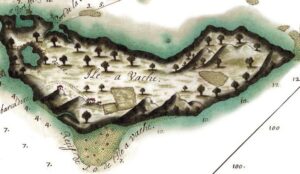
In a eulogy for statesman Henry Clay in 1852, Lincoln expressed his hope for colonization: “If as the friends of colonization hope…[we] succeed in freeing our land from the dangerous presence of slavery; and, at the same time, in restoring a captive people to their long-lost father-land, it will indeed be a glorious consummation.”
The Île à Vache Plan
Nearly a month before signing the contract with Kock, Lincoln had proposed a constitutional amendment to Congress, advocating the colonization of African Americans outside the United States, including federal compensation for slave owners who lost their property due to emancipation. After considering another plan to relocate freed Black Americans to the Chiriquí province of Panama, Lincoln settled on Kock’s proposal for Île à Vache.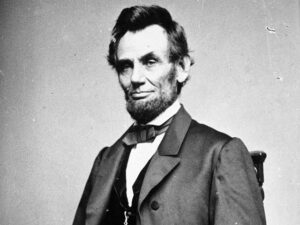
Under Kock’s plan, the relocated individuals would work on a cotton plantation, receive homes, and have access to hospitals and schools. After completing four-year work contracts, they would be given 16 acres of land and the wages earned over that period. Colonization was voluntary but strongly encouraged by Lincoln, Kock, and other proponents. Kock optimistically described the plan: “The intelligent negro may enter upon a life of freedom and independence, conscious that he has earned the means of livelihood, and at the same time disciplined himself to the duties, the pleasures and wants of free labor.”
Opposition and Criticism
The colonization movement was unpopular among most African Americans and abolitionists. Frederick Douglass, a prominent abolitionist, vehemently opposed the idea. In his newspaper, The North Star, Douglass wrote in 1849, “Shame upon the guilty wretches that dare propose, and all that countenance such a proposition. We live here—have lived here—have a right to live here, and mean to live here.”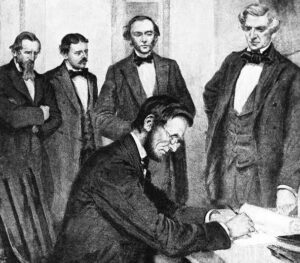
On August 14, 1862, Lincoln met with a delegation of Black leaders at the White House to advocate for voluntary emigration. He argued, “Your race suffer from living among us, while ours suffer from your presence… It is better for us both, therefore, to be separated.” Douglass, who was not invited to the meeting, criticized the proposal in his publication, Douglass’ Monthly, comparing it to trying to bow out of a debt or guilt.
The Failed Colonization Effort
Despite opposition, Lincoln proceeded with the plan. On April 14, 1863, the vessel Ocean Ranger departed from Fortress Monroe, Virginia, with 453 African American emigrants aboard, headed to Île à Vache. The mission was doomed from the start. By the time the Ocean Ranger reached the island in early May, at least 30 passengers had died from smallpox. The promised second ship with essential supplies never arrived, and Kock had misled the government and settlers about the island’s living conditions.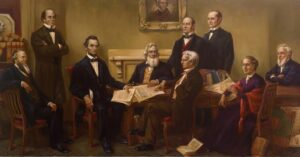
A government official visiting Île à Vache found the settlers in dire conditions, living in makeshift huts and suffering from inadequate resources. Kock’s self-printed currency and exploitative policies exacerbated their plight, leading to threats of revolt. Ultimately, Kock fled the island.
Abandonment and Aftermath
By the summer of 1863, news of the dire situation reached Lincoln. Union army chaplain John Eaton reported the intense suffering of the settlers due to a pest infestation. On February 1, 1864, Lincoln ordered Secretary of War Edwin Stanton to commission a naval vessel to rescue the remaining settlers. The Navy’s Marcia C. Day returned 350 surviving emigrants to Alexandria, Virginia, on March 20.
In March, Lincoln signed a bill withdrawing the $600,000 appropriated for colonization, signaling the end of his support for the policy. According to historian Graham Welch, Lincoln’s silence on colonization following the Île à Vache debacle indicated his shift toward exploring integration for freed slaves into American society.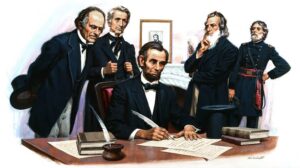
While the Île à Vache effort was a tragic failure, leading to significant suffering and loss of life, it marked a turning point. The abandonment of colonization as a government policy heartened many African Americans who opposed emigrating. This shift toward integration laid the groundwork for a new chapter in the fight for racial equality in the United States.
In conclusion, Lincoln’s colonization efforts, particularly the Île à Vache endeavor, highlight the complexities and challenges of addressing the aftermath of slavery. The failure of the colonization plan underscored the need for a more inclusive approach, eventually leading to the exploration of integration and civil rights for African Americans.

